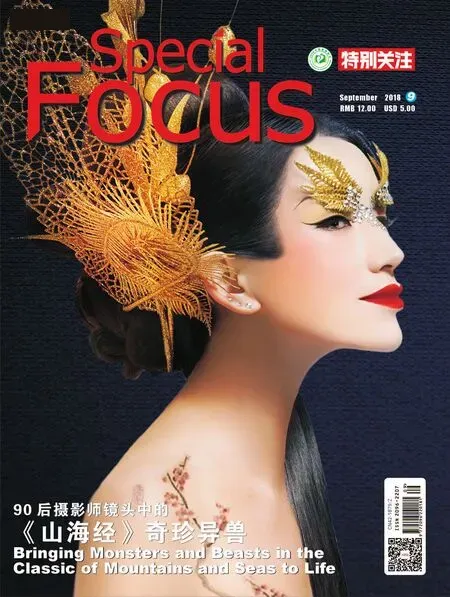When the Mid-Autumn Festival Comes
2018-10-15CompiledbyZhangChengyi
Compiled by Zhang Chengyi
The Mid-Autumn Festival is one of the most anticipated and important festivals among Chinese. Children canfinally eat the moon cakes that are on display all around them for the month before. Grownups cherish the precious chance to gather together with relatives and friends. Elders wait for their children to arrive back at home. Whatever the reason is to look forward, the Mid-Autumn Festival is one of the most remarkable celebrations in China.

Yellowish, fragrant cakes immediately pop into the mind of every Chinese individual when thinking about the Mid-Autumn Festival. Moon cakes were originated in the Song Dynasty(960-1279). As the great Song poet Su Shi wrote: “Little cakes resembling the moon, with crisps and sweets in it.”
There are also fascinating historical anecdotes about moon cake from other times. The very first emperor of Ming Dynasty(1368-1644), Zhu Yuanzhang(1328-1398), used mooncakes as envelopes during his revolution.At that time, the emperor of Yuan Dynasty (1271-1368) had extremely rigid restrictions about message sending, making it excessively difficult for the rebellion to communicate with other revolutionary forces. The leader of the rebellion, Zhu Yuanzhang, came up with a genius idea—to put the secret messages of initiating the revolutionary war on the night of August 15 in the round, fragrant cakes to communicate with his allies. The revolution was a great success.After becoming the emperor of the new dynasty, euphoric Zhu Yuanzhang made moon cakes a dessert of celebrating success,and the tradition passed on from generation to generation.

In addition to this tale of intrigue and espionage, another popular story must be the tale of Chang’e, the moon goddess.It has many versions, and one of them goes like this: Once upon a time, there was an intrepid archer called Houyi, who saved the world from ten flaming hot suns by shooting down nine of them,bringing a comfortable climate to all human beings. The people made him the emperor. However,he became an indifferent and brutal tyrant. Houyi went to the goddess Nuwa to seek eternal life and returned with some “longevity pills.” His wife, Chang’e, was a considerate woman who didn’t want her husband to suppress the people forever, so she ate the pills secretly, and fl oated up to the moon.
Beyond all of these tales,the Mid-Autumn Festival has its practical meaning. It is an opportunity to gather together with family members and friends,and send messages of love,longing, and greetings to each other. The moon is truly like a communication satellite, helping people send their messages of longing to each other.
中秋节是中国人一年中最翘首以盼的节日之一。孩子为吃月饼,已经馋了几个月了。成年人则更看重与亲朋好友团聚的宝贵机会。老人们都期待着儿女能回到身边团聚。不论缘由几何,中秋节是中国最隆重节日之一。
一提到中秋,首先跃入脑海的是黄澄澄、香喷喷的月饼。月饼的起源可以追溯到宋朝。宋朝文豪苏轼曾写道:“小饼如嚼月,中有酥和饴”。
关于月饼,有这样一个有趣的故事。明朝的开国皇帝朱元璋,曾利用月饼作信封传递起义的消息。当时的元朝皇帝对于消息的传递有着非常严苛的限制,统一全国的起义力量推翻元朝统治难于登天。朱元璋作为起义军的首领,想出了一个绝妙的主意:把“八月十五夜起义”的密信塞进圆圆的大饼子里,跟各方起义军联系,起义的消息密不透风地传到各地。元朝被彻底推翻。登基以后,大喜过望的朱元璋自然是对这功不可没的小饼情有独钟,于是便将它作为庆典糕点推广,逐渐演化成了八月十五吃月饼的习俗。
另一个和中秋有关的传说是“嫦娥奔月”,有多个版本,其中之一这样写道:相传很久以前,勇猛的弓箭手后裔射下了九个暴晒人间的太阳,为大地带来了宜人的天气。后羿因此深受爱戴,人们奉他为王。后羿称王后日渐膨胀,变成了一个暴君。他去找女神女娲索要长生不老的方法,并带回了几颗长生不老药。后羿的妻子嫦娥,不愿看到夫君推行暴政。为了人民的利益,她抢过长生不老药,全部吃下,飘然飞进月宫,成了月中仙。
除去传说,中秋节更现实的意义,在于家人团聚和亲友寄托思念。“海上生明月,天涯共此时。” 当所有人都欣赏这共同的美景时,对远方亲友的相思油然而生。明月成了一颗通讯卫星,为地球上的万亿终端,传递相思情义。
